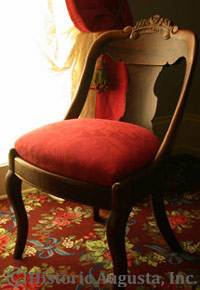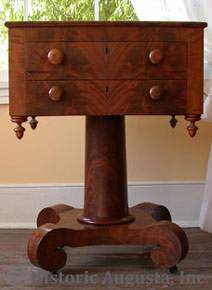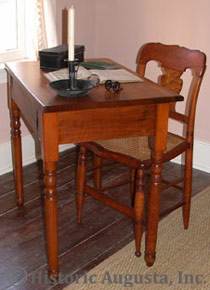About Boyhood Home
Historic Augusta, Inc. purchased the former Presbyterian Manse at public auction on March 23, 1991. The City of Augusta provided the funds with which to purchase the house through a grant to Historic Augusta. At the time of the purchase the building housed a beauty parlor and florist shop, as well as a private residence. Historic Augusta President Nancy Bowers appointed a committee to give direction to the Board of Trustees, with John C. Hagler, III as chairman. Thanks to seed money provided by The Creel Foundation, the services of architect Norman Davenport Askins of Atlanta were procured to guide the committee through the process of studying the house and determining its best use. The results of this study, which included an architectural assessment by Askins, an archaeological assessment by Dr. David C. Crass, an historical assessment by Erick D. Montgomery and landscape considerations by Mary Palmer and Hugh Dargan, were published in February, 1994. It was agreed that the site was highly significant for its association with the boyhood of President Woodrow Wilson and it should be developed as a house museum to tell his story as a Southerner. Collaborating in this assessment was the late Arthur S. Link, of Princeton University, the foremost authority and biographer of the 28th President. Link came to Augusta for the first time in May 1992, to be the keynote speaker at the first Woodrow Wilson Symposium, organized by Dr. Edward J. Cashin, Jr. of Augusta State University.
Actual restoration began with replacement of the roof, which leaked so badly that much plaster was lost from original interior ceilings. This was followed with architectural plans and construction drawings. To return it to its 1860’s appearance, demolition of additions and alterations proceeded. A facade rehabilitation grant was procured from the city to clean and restore the Seventh and Telfair Street sides of the house. Small grants and gifts were collected, but it was determined that the total cost of the project would be over $2 million. This included the Joseph R. Lamar Boyhood Home on the adjacent property, which was acquired in 1995 to provide visitor and staff support space for the museum. Its rehabilitation is ongoing.
Under the leadership of Carolyn A. Simon, president of Historic Augusta, (1997-1999), a steering committee was appointed, chaired by Julian W. Osbon. In 1998, the Steering Committee recommended to the Board of Trustees that the organization commit to a Capital Campaign to raise the necessary funds to complete the project. It was determined that $1.5 million could be raised with the help of National Community Development Services, Inc.. Chaired by Patrick G. Blanchard, the campaign lasted through the early part of 1999 and the necessary funds were pledged over a six year period. As money began to come in, work progressed on the restoration of the house. Under the leadership of Paul S. Simon and Clayton P. Boardman, III, the firm of Capers and Associates of Augusta was engaged as general contractor.



Shara B. Overstreet, Furnishings Committee Chairman, retained Sara B. Chase of Lexington, Massachusetts as a paint analyst to determine the original wall colors. Three doors were regrained and mantles remarbleized by Bob Christian of Savannah. Appropriate floor coverings, window treatments and furnishings were procured by loan, gift and purchase from many sources. Among the furnishings are 13 original pieces that were in the house during the Wilson occupancy and are on loan from the First Presbyterian Church. A garden plan, partially funded by The Creel Foundation and the Garden Club of Georgia, was developed by the Gardens Committee, chaired successively by Sissie Morris and Anne Creamer Manning. Appropriate plants for the garden were donated by Barbara Botts of Green Thumb West Garden Center and Interpretation of the house was chaired by Dr. Lee Ann Caldwell.
The Boyhood Home of President Woodrow Wilson will serve as a house museum depicting the life of the 28th President as a boy growing up in Georgia during the Civil War and Reconstruction. As the oldest Presidential residence in the state, it will serve as an educational facility and a historic attraction for the City of Augusta, the State of Georgia and the Nation.

